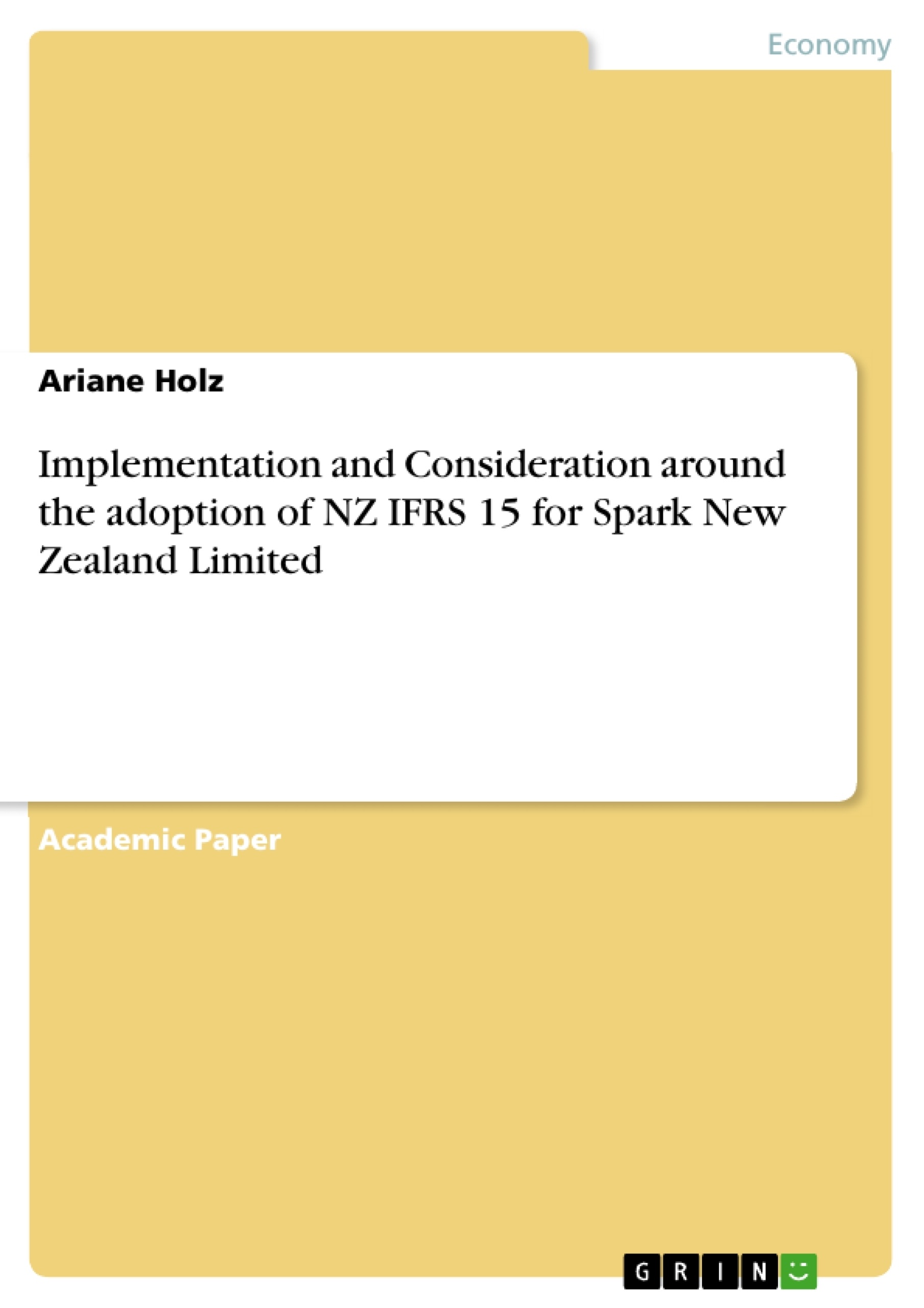This report aims to investigate the impact of NZ IFRS 15 on the telecommunication industry. The main focus will be on Spark Limited, a New Zealand based company that will effectively implement NZ IFRS 15 from the financial year ending 30 June 2019 (Spark New Zealand, 2018). In the wake of this, we will provide some background on the introduction of the standard, the implementation as proposed by the five-step model, the impact on the financial results for Spark, as well as practical business consideration for the retrospective adoption. Spark expects the adoption of the standard to have an effect on its accounting operations, particularly regarding the allocation of transaction prices. To ensure a smooth transition, the company will need to assess its impact and prepare departments and stakeholders for the anticipated changes.
In July 2014, the New Zealand Accounting Standards Board published a new standard that introduced significant changes to how companies recognise, measure and disclose revenue in their financial statements. The adoption of NZ IFRS 15 Revenue from Contracts with Customers is fraught with hurdles for telecommunications entities due to the variety of plans they offer and the frequency at which customer make changes to their plans (Ernst & Young, 2015).
Inhaltsverzeichnis (Table of Contents)
- The background behind the introduction of NZ IFRS 15
- The impact of NZ IFRS 15 on the telecommunication industry.
- Identify the contract(s) with a customer..
- Identify the performance obligations in the contract(s).
- Determine the transaction price...........
- Allocate the transaction price to the performance obligations.
- Recognise revenue when (or as) the entity satisfies each performance obligation......
- Financial consequences of the adoption of NZ IFRS 15 for Spark............
- Practical business considerations around the adoption of NZ IFRS 15 for Spark
- Retrospective approach .....
- Information systems.
- Training & Communication
- Recommendations to Spark concerning the adoption of NZ IFRS 15.
- Conclusion.....
Zielsetzung und Themenschwerpunkte (Objectives and Key Themes)
This report aims to investigate the impact of NZ IFRS 15 on the telecommunication industry, focusing on Spark Limited, a New Zealand based company that will implement NZ IFRS 15 from the financial year ending 30 June 2019. It covers the introduction of the standard, its implementation, the impact on Spark's financial results, and practical business considerations for its retrospective adoption.
- The introduction and objectives of NZ IFRS 15
- The impact of NZ IFRS 15 on the telecommunication industry
- The application of NZ IFRS 15 to Spark Limited
- Practical considerations for the adoption of NZ IFRS 15
- Recommendations for Spark concerning the adoption of NZ IFRS 15
Zusammenfassung der Kapitel (Chapter Summaries)
The report begins by outlining the background behind the introduction of NZ IFRS 15, highlighting its aim to address inconsistencies and simplify revenue recognition in financial statements. It then delves into the impact of the standard on the telecommunication industry, particularly the challenges faced by companies offering diverse mobile plans and frequent customer modifications.
The report further explores the five-step approach outlined in NZ IFRS 15 for identifying contracts, performance obligations, determining transaction prices, allocating those prices, and recognizing revenue based on the satisfaction of performance obligations. This section provides specific examples relevant to the telecommunication industry.
The report then analyzes the financial consequences of adopting NZ IFRS 15 for Spark, with a focus on the implications for transaction price allocation. Finally, the report concludes by discussing practical business considerations for Spark's adoption, including the retrospective approach, information systems, and training & communication needs.
Schlüsselwörter (Keywords)
This report focuses on the key concepts and themes surrounding NZ IFRS 15, including its introduction, impact on the telecommunication industry, application to Spark Limited, practical business considerations for adoption, and recommendations for successful implementation. Key terms include: revenue recognition, performance obligations, transaction price, telecommunication industry, financial reporting, contract modifications, retrospective adoption, information systems, training, and communication.
- Quote paper
- Ariane Holz (Author), 2018, Implementation and Consideration around the adoption of NZ IFRS 15 for Spark New Zealand Limited, Munich, GRIN Verlag, https://www.grin.com/document/536408




